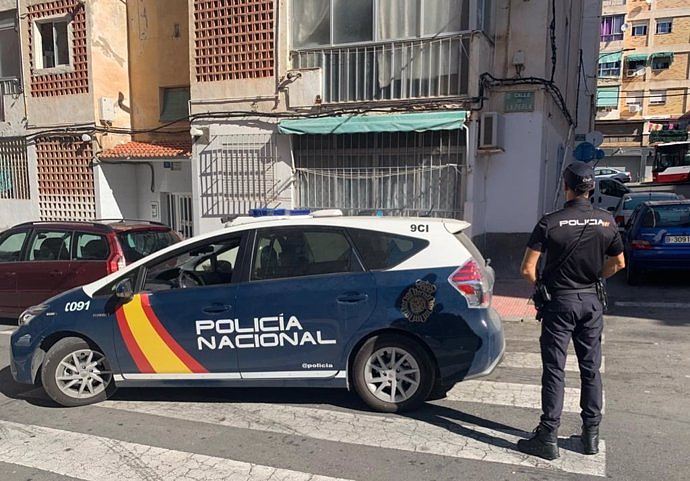Interior statistics reflect a downward trend in both investigations with arrests and criminal infractions
MADRID, 3 Mar. (EUROPA PRESS) -
Data from the Ministry of the Interior reflects that half of the 36,842 detained and investigated since 2020 for crimes related to the occupation of homes are foreign citizens, as well as that there is a downward trend in both investigations with arrestees and criminal infractions due to complaints for burglary and usurpation of property.
A total of 7,057 people were detained or investigated for home occupation crimes, of which half of them (3,544) were foreigners, according to statistics from the Ministry of the Interior between January and September 2023, according to a parliamentary response. consulted by Europa Press.
In 2022, a total of 9,721 people were arrested or investigated - between January and December - of which 4,866 were foreigners and another 4,855 were Spanish nationals. That year, 16,765 criminal offenses for usurpation or trespassing of property were registered, compared to the 11,539 recorded between January and September 2023.
In previous years, this proportion has been maintained in relation to housing occupancy, according to a parliamentary response to Vox with the data provided by the National Police, the Civil Guard, and regional and local police to the Crime Statistical System.
The Interior statistics reflect that, without recording the last three months of 2023, the number of detained or investigated has been decreasing slightly since 2020, a year marked by the restrictions of the Covid-19 pandemic and in which instructions against 'squatting'.
In 2021, those detained or investigated rose to 10,030 people - of them, 4,969 foreigners -, practically the same figure as in 2020, when there were 10,034 - then, with 5,359 foreigners -.
In parallel, criminal offenses for usurpation and trespass rose from 14,792 in 2020 to 17,274 in 2021, then moderated to 16,765 offenses throughout Spain in 2022 and continued the downward trend between January and September 2023, with 11,539. complaints.
The data appears in a parliamentary response from the Government, dated February 12, which recalls the instructions of the Prosecutor's Office and the Ministry of the Interior for the State Security Forces and Corps to act "urgently and peremptorily in case of breaking and entering, vacating the homes immediately, as long as you have permission from the resident and he or she has filed a complaint.
"The State Security Forces and Bodies also act in the case of usurpations of real estate, residential or not, but which are not a residence," continues the Government, which explains that in these cases police intervention is subject to a court order. prior eviction, "in addition to the owner's manifest intention to recover his property."
This is the case in cases of usurpation, they add, "unless they can intervene at the moment in which the crime is being committed and it is with violence or intimidation, in which case the State Security Forces and Bodies can evict cases of usurpation. usurpation at the time".
The Interior statistics also reflect that Catalonia has more cases of home occupation than Andalusia, the Valencian Community and the Community of Madrid, the three autonomous communities that follow with the most criminal offenses of both trespassing (article 202 of the Penal Code) and of usurpations, whether residential or not and whether or not through violence (article 245).
Infractions related to 'squatting' have suffered a slight downward trend in Spain as a whole since, in September 2020, the orders of the Prosecutor's Office and the Ministry of the Interior came into force to combat this problem. Specifically, Catalonia continues to lead the way in 'squatters', accounting for 40% of the total.
In September 2020, after a summer of news about property occupations that led to political debate, the State Attorney General's Office issued an instruction to expedite precautionary measures and facilitate eviction when a crime of trespassing is committed, to which followed another instruction from the Interior to unify action criteria.
According to Interior statistics consulted by Europa Press, with data from all State Security Forces and Bodies, in 2020 a total of 14,792 criminal offenses were recorded. In 2021, the first year with the instruction in force, these crimes rose to 17,274 (16%), although in 2022 the figure moderated to 16,726 (-3%). In 2023, until September, there were 11,539 'squats' in Spain as a whole.
In 2020, when approving the 'anti-squatter' instruction, the Ministry of the Interior recognized the "social confusion and alarm", and related it to the differences between home invasion and usurpation: in the first cases it is contemplated that the Security Forces evict both in first and second homes "without the need to request judicial measures, in case of flagrante delicto, immediately", including the "identification of the occupants and their arrest if appropriate."
From the Interior they refer to the data of the State Attorney General's Office collected in the institution's report corresponding to the year 2022, where it is recorded that only 0.16% of generic occupation crimes refer to trespass crimes. Specifically, a total of 8,868 procedures for usurpation were initiated, 9% less than in the previous year, and 96 procedures for trespass.

 Exploring Cardano: Inner Workings and Advantages of this Cryptocurrency
Exploring Cardano: Inner Workings and Advantages of this Cryptocurrency Seville.- Economy.- Innova.- STSA inaugurates its new painting and sealing hangar in San Pablo, for 18 million
Seville.- Economy.- Innova.- STSA inaugurates its new painting and sealing hangar in San Pablo, for 18 million Innova.- More than 300 volunteers join the Andalucía Compromiso Digital network in one month to facilitate access to ICT
Innova.- More than 300 volunteers join the Andalucía Compromiso Digital network in one month to facilitate access to ICT Innova.-AMP.- Ayesa acquires 51% of Sadiel, which will create new technological engineering products and expand markets
Innova.-AMP.- Ayesa acquires 51% of Sadiel, which will create new technological engineering products and expand markets COMUNICADO: Energy Transitions Commission (ETC) Urges Government and Industry Collaboration to Overcome Perceptions of Offshore Wind
COMUNICADO: Energy Transitions Commission (ETC) Urges Government and Industry Collaboration to Overcome Perceptions of Offshore Wind UGT and CCOO demand the regeneration of democracy, better salaries and a reduction in working hours
UGT and CCOO demand the regeneration of democracy, better salaries and a reduction in working hours Alcaraz gives up his reign in Madrid against Rublev
Alcaraz gives up his reign in Madrid against Rublev Petro announces that Colombia will break diplomatic relations with Israel
Petro announces that Colombia will break diplomatic relations with Israel How Blockchain in being used to shape the future
How Blockchain in being used to shape the future Not just BTC and ETH: Here Are Some More Interesting Coins Worth Focusing on
Not just BTC and ETH: Here Are Some More Interesting Coins Worth Focusing on Ivace and promotes a less invasive device for the early detection of prostate cancer
Ivace and promotes a less invasive device for the early detection of prostate cancer Valencia unanimously approves the ordinance to allocate spaces to test innovative initiatives
Valencia unanimously approves the ordinance to allocate spaces to test innovative initiatives UPV researchers promote a paid master's degree as a "talent factory" in integrated photonics
UPV researchers promote a paid master's degree as a "talent factory" in integrated photonics A spin-off of the UV works on obtaining high-resolution 3D biomedical images in real time
A spin-off of the UV works on obtaining high-resolution 3D biomedical images in real time A million people demonstrate in France against Macron's pension reform
A million people demonstrate in France against Macron's pension reform Russia launches several missiles against "critical infrastructure" in the city of Zaporizhia
Russia launches several missiles against "critical infrastructure" in the city of Zaporizhia A "procession" remembers the dead of the Calabria shipwreck as bodies continue to wash up on the shore
A "procession" remembers the dead of the Calabria shipwreck as bodies continue to wash up on the shore Prison sentences handed down for three prominent Hong Kong pro-democracy activists
Prison sentences handed down for three prominent Hong Kong pro-democracy activists ETH continues to leave trading platforms, Ethereum balance on exchanges lowest in 3 years
ETH continues to leave trading platforms, Ethereum balance on exchanges lowest in 3 years Investors invest $450 million in Consensys, Ethereum incubator now valued at $7 billion
Investors invest $450 million in Consensys, Ethereum incubator now valued at $7 billion Alchemy Integrates Ethereum L2 Product Starknet to Enhance Web3 Scalability at a Price 100x Lower Than L1 Fees
Alchemy Integrates Ethereum L2 Product Starknet to Enhance Web3 Scalability at a Price 100x Lower Than L1 Fees Mining Report: Bitcoin's Electricity Consumption Declines by 25% in Q1 2022
Mining Report: Bitcoin's Electricity Consumption Declines by 25% in Q1 2022 Oil-to-Bitcoin Mining Firm Crusoe Energy Systems Raised $505 Million
Oil-to-Bitcoin Mining Firm Crusoe Energy Systems Raised $505 Million Microbt reveals the latest Bitcoin mining rigs -- Machines produce up to 126 TH/s with custom 5nm chip design
Microbt reveals the latest Bitcoin mining rigs -- Machines produce up to 126 TH/s with custom 5nm chip design Bitcoin's Mining Difficulty Hits a Lifetime High, With More Than 90% of BTC Supply Issued
Bitcoin's Mining Difficulty Hits a Lifetime High, With More Than 90% of BTC Supply Issued The Biggest Movers are Near, EOS, and RUNE during Friday's Selloff
The Biggest Movers are Near, EOS, and RUNE during Friday's Selloff Global Markets Spooked by a Hawkish Fed and Covid, Stocks and Crypto Gain After Musk Buys Twitter
Global Markets Spooked by a Hawkish Fed and Covid, Stocks and Crypto Gain After Musk Buys Twitter Bitso to offset carbon emissions from the Trading Platform's ERC20, ETH, and BTC Transactions
Bitso to offset carbon emissions from the Trading Platform's ERC20, ETH, and BTC Transactions Draftkings Announces 2022 College Hoops NFT Selection for March Madness
Draftkings Announces 2022 College Hoops NFT Selection for March Madness























